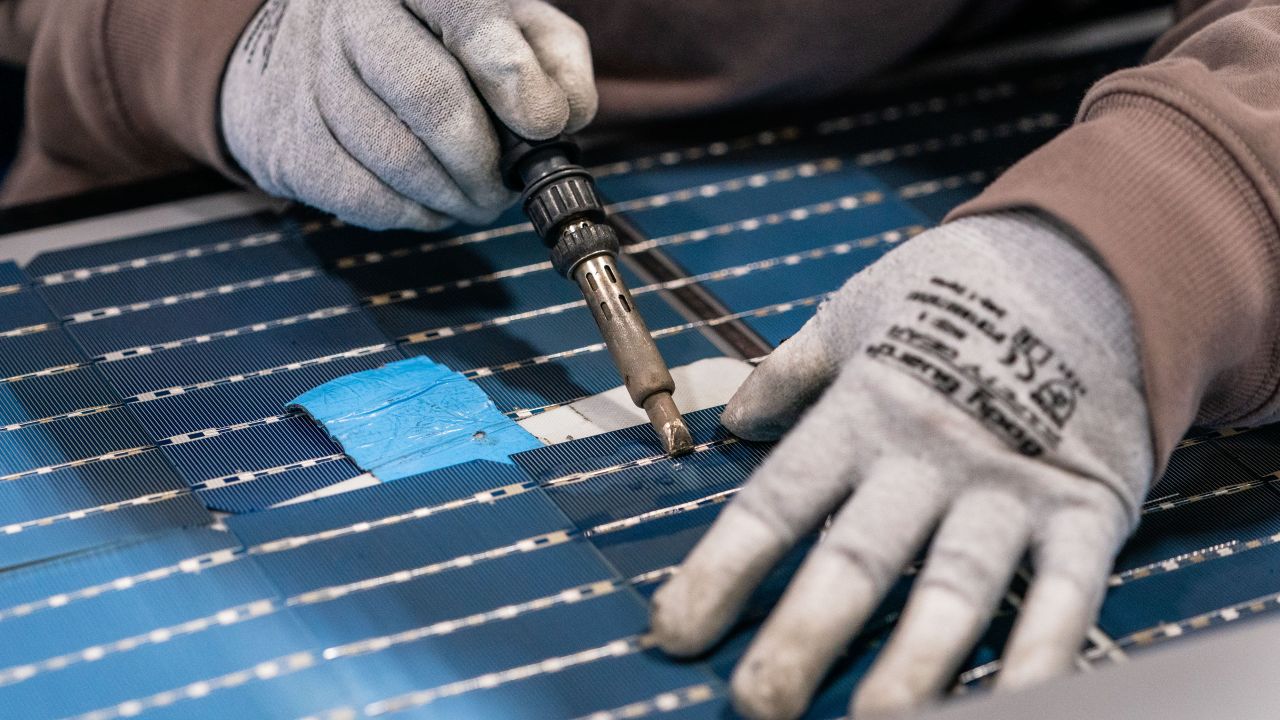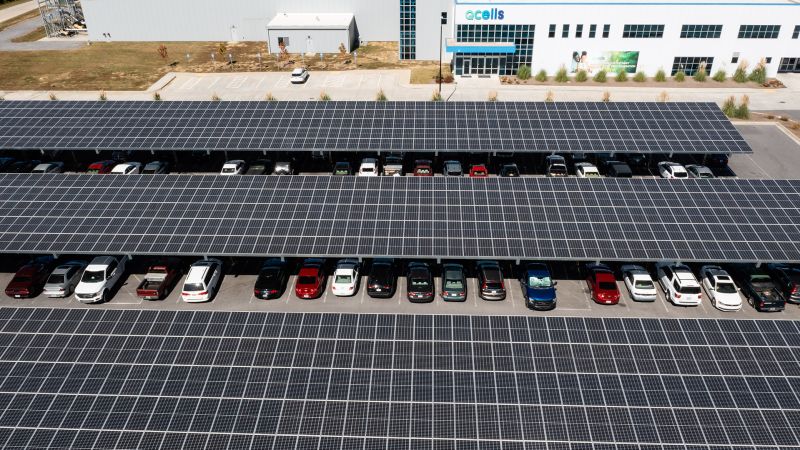CNN
—
More than two dozen House Republicans who recently welcomed multi-million-dollar clean energy manufacturing investments in their districts voted Wednesday to repeal the tax incentives that stimulated those very same projects.
The clean energy tax incentives are among a slew of measures from the Inflation Reduction Act the Republican lawmakers voted to repeal as part of Speaker Kevin McCarthy’s bill to cut government spending and raise the debt ceiling into next year.
The House bill is dead on arrival in the Senate, but the vote represents a potential political vulnerability that the White House and Democratic groups intend to leverage against those lawmakers. Democrats plan to accuse them of jeopardizing jobs in their districts – and use the vote to draw a contrast between President Joe Biden and House Republicans. Already, a climate advocacy group is launching its first ads targeting a half dozen of the Republicans whose districts have benefited from the climate provisions.
It’s a potential political vulnerability that the White House and Democratic groups intend to leverage against those lawmakers – accusing them of jeopardizing jobs in their districts – and use to draw a contrast between President Joe Biden and House Republicans. Already, a climate advocacy group is launching its first ads targeting a half dozen of the Republicans whose districts have benefited from the climate provisions.
The votes highlight a fundamental irony about Republican efforts to repeal the landmark climate provisions of the Inflation Reduction Act: a majority of the more than $150 billion in clean energy manufacturing investments announced since the IRA became law are being poured into GOP districts, according to data compiled by the American Clean Power Association and verified by CNN.
Of the announced investments with a confirmed location, more than 80% of those investments have been in GOP districts, according to the association, which lobbies on behalf of clean energy.
The White House has already assailed Republican efforts to repeal the clean energy tax credits as one that would ax the law’s “investments in manufacturing and cheaper energy, which would offshore American manufacturing, kill tens of thousands of manufacturing jobs, undermine American energy security, and raise Americans’ utility bills,” according to a memo by White House deputy press secretary Andrew Bates.
Climate Power and the League of Conservation Voters launched a seven-figure ad campaign this week targeting Republicans for the debt ceiling vote, accusing them of seeking to “repeal investments in affordable clean energy and manufacturing that are already creating hundreds of thousands of jobs across America.”
The local ads target six Republicans – Reps. Marc Molinaro of New York, Mark Amodei of Nevada, Juan Ciscomani of Arizona, Nancy Mace of South Carolina and Brandon Williams of New York – and highlight a clean energy project in their districts facilitated by the IRA’s clean energy provisions.
Tom Jensen, the CEO of industrial-scale battery manufacturer FREYR Battery, announced in November plans into invest up to $2.6 billion to build a new factory in Coweta County, Georgia – part of Georgia’s Republican-led 3rd congressional district. He said the IRA was key to the pace and scale of that investment.
“The Inflation Reduction Act is the core catalyst for us accelerating our plans,” Jensen said in an interview.
GOP Rep. Drew Ferguson, who represents the district, has railed against clean energy provisions in the Inflation Reduction Act and voted for McCarthy’s debt ceiling bill. His office did not respond to CNN’s request for comment.
Jensen said repealing the provisions wouldn’t stop the long-term growth of clean energy, but it would “have an impact on the pace and the rollout trajectory” of clean energy investments and said “the only way to move fast” is with government support.
Asked for his message to lawmakers such as Ferguson, Jensen said: “Stick to the Inflation Reduction Act, it’s a very strong incentive program that will accelerate the deployment of lower cost energy infrastructure.”
Freyr isn’t the only manufacturer in his district that would benefit from the climate provisions he voted to repeal. Auto manufacturer Kia also announced that it will begin producing its 2024 EV9 electric SUV in Ferguson’s district, an announcement Ferguson heralded on Twitter, calling it “very exciting news” that “shows Kia’s continued investment in our #GA03 community.”
Rep. Marjorie Taylor Greene, a Republican from Georgia, is also among the 26 Republicans. QCells, a clean energy company, announced a $2.5 billion expansion of its solar panel manufacturing operations in January that the company says will create more than 2,500 jobs.

The company has called the IRA’s climate provisions a “game changer.”
Taylor Greene welcomed the investment at the time, but has pushed for a repeal of the Inflation Reduction Act. She told Politico in January that she is “not against renewable energy” but doesn’t believe is should be “federally subsidized like in the manner that it has been.”
Here are the 26 Republican lawmakers and clean energy investments announced in their districts since passage of the Inflation Reduction Act, based on publicly available information and CNN-verified data from the American Clean Power Association and Climate Power:
- Rep. Ralph Norman, South Carolina: $1.3 billion lithium processing investment, Albemarle
- Rep. Thomas Massie, Kentucky: $1 billion battery factory, EnerVenue
- Rep. Carol Miller, West Virginia: $760 million iron-air battery manufacturing facility, Form Energy
- Rep. Chuck Fleischmann, Tennessee: – $600 millium, TN Lithium
- Rep. Drew Ferguson, Georgia: $2.6 billion, Freyr
- Rep. Marjorie Taylor Greene, Georgia: $2.5 billion, QCells
- Rep. Marc Molinaro, New York: Zinc8
- Rep. Mike Collins, Georgia: Adion Solar
- Rep. Michael McCaul, Texas: Alpha Steel
- Rep. Robert Aderholt, Alabama: First Solar
- Rep. Barry Loudermilk, Georgia: QCells
- Rep. Pete Stauber, Minnesota: $7 million, Heliene
- Rep. Troy Balderson, Ohio: $600 million, Illuminate USA
- Rep. Paul Gosar, Arizona: Meyer Burger
- Rep. Dan Newhouse, Washington: REC Silicon & Mississippi Silicon
- Rep. Lauren Boebert, Colorado – CS Wind
- Rep. Brett Guthrie, Kentucky: $1.7 billion, Nucor Steel
- Rep. Ashley Hinson, Iowa: Siemens Gamesa & TPI Composites
- Rep. Tracey Mann, Kansas: Siemens Gamesa
- Rep. Joe Wilson, South Carolina: $2 billion electric vehicle manufacturing, Scout Motors
- Rep. Mark Green, Tennessee: $3.2 billion battery material processing, LG Chem
- Rep. Mike Carey, Ohio: $3.5 billion battery manufacturing, Honda/LG
- Rep. Nancy Mace, South Carolina: $3.5 billion lithium recycling plant, Redwood Materials
- Rep. Lisa McClain, Michigan: $426 million electric vehicle manufacturing, Magna
- Rep. Juan Ciscomani, Arizona: Ecobat & Cirba Solutions
- Rep. Marc Amodei, Nevada: $650 million, GM/Lithium Americas Corp & $3.6 billion, Tesla

